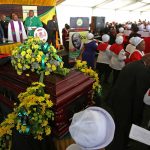Corruption whistleblower fears for his life
Despite being shot and living in hiding, Thabiso Zulu cannot get the government protection he needs. He says he is being punished for breaking the code of silence in the ANC.
Author:
31 October 2019

Shot up, living in hiding and running a fever, corruption whistleblower Thabiso Zulu inhabits a Kafkaesque world. He says President Cyril Ramaphosa gave him a call when news of the shooting went public, but his government won’t offer Zulu the protection he has begged for repeatedly for almost two years. Zulu, an ANC member and friend of murdered ANC heavyweight Sindiso Magaqa, says he has been “failed by my government”.
“I am being punished for breaking an omerta [mafia code of silence]. I am being left exposed, vulnerable to attack,” Zulu says. While an ANC member, Zulu is also a fierce critic of the party and Police Minister Bheki Cele’s specialised unit investigating political violence. He has slated the unit for its lack of progress and has been equally cutting of the ANC, blaming political killings on “gangsters in our own organisation”.
On the night of 26 October 2019, Zulu was travelling on Thokoza Road near Pietermaritzburg with a friend when they were attacked by three men. One had a rifle. “They were shooting us like wild animals … My friend was unhurt. I was shot in the arm. I am in serious pain. I discharged myself from the hospital because I feared I may be finished off by hitmen,” Zulu says.
In the two weeks preceding Zulu’s shooting, New Frame asked various state departments about his appeal for safety. Three threat assessments recommended he be given protection, but none have been implemented.
In 2017, the state security agency, at the request of the public protector, found that Zulu and his colleague, Les Stuta, were in need of “urgent” state protection on account of their corruption whistleblowing. But the protection never came and Zulu has been living at the mercy of family and friends, who have helped him pay for private security while trying to secure state protection. The public protector’s order that Zulu be guarded was taken on review in court by Cele.
Related article:
Zulu has made representations to a range of police agencies regarding more than 25 corruption cases but, curiously, was not asked by the police to be a witness in Magaqa’s murder case. A police officer called Zulu a few days before the case resumed in court recently to ask for his address, but nothing more came of the conversation.
South African Police Service (SAPS) spokesperson Vish Naidoo said the public protector’s report was the subject of opposing affidavits that would be tested in court. “We are now awaiting a court date.” The SAPS, Naidoo added, could not comment further, in spite of what appears to be an obvious threat to Zulu’s life.
Worse than death
Last week Jay Govender, the legal adviser to Inspector General of Intelligence Setlhomamaru Dintwe, said Zulu had complained about his case in April.
“The investigation revealed that the threat assessment was done by the state security agency who recommended that Mr Zulu receive protection. However, the responsibility to provide this protection resides with protection and security services, a division within SAPS over whom the inspector general does not have a mandate.”
Zulu remains resolute about exposing corruption. “There is not even a single political master who has been charged for any of the killings. There are no convictions, nothing. Claims of brutality against the [SAPS] team are rife.” But he says he and his family are not safe. “I think I have been exposed so as to be killed. I know that I offended many senior government and politicians by exposing fraud and corruption. My family is affected by the precautions we have to take. I have to be on 24-hour alert, be careful of what I say over the phone, limit my movements and the people I allow in my space.”
Zulu heard a line in a movie once to the effect that anticipation of death is worse than death itself. “I can now attest, it’s true,” he says.
It has been days since Ramaphosa promised Zulu protection and nothing has materialised. The president’s spokesperson, Khusela Diko, refused to comment: “We must allow the police to do their work unhindered,” she said.

